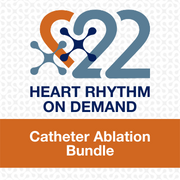A curated bundle of Catheter Ablation sessions presented at Heart Rhythm 2022. The education is presented in various learning formats, including Case-Based, Case-Based: Complicated Case, Debate, Core Curriculum, Abstracts, and more.
Content Overview
The Catheter Ablation category contains the following sessions from Heart Rhythm 2022:
- A Critical Appraisal of Tools for Improving Success or Safety of Atrial Fibrillation Ablation (CA-537)
- Acute and Long-Term Outcomes after Pulsed Field Ablation for the Treatment of Atrial Fibrillation (CA-536)
- Adjunctive Methods for Improving Safety and Efficacy of Catheter Ablation (CA-491)
- Advances in Clinical Trials (CA-746)
- Best Approaches for Ablation of Long-Standing Persistent Atrial Fibrillation (CA-377)
- Best Strategies for Safe Access to the Epicardial Space (CA-359)
- Building a Better Lesion: Investigations into Radiofrequency and Pulsed Field Ablation Biophysics (CA-527)
- Cardiac Pulsed Field Ablation - Unfolding the Mysteries (JS-448)
- Cardioneuroablation: Patient Selection, Mapping, and Ablation (CA-069)
- Case Based Approaches for Targeting Intramural Ventricular Substrate (CA-489)
- Case Based Approaches to Difficult Supraventricular Tachycardia Ablations (CA-355)
- Challenging Ablation Cases and Unusual Approaches (CA-141)
- Complex Cases for the Ablationist (PC-577)
- Debate: Ablation of Atrial Fibrillation is a Life-Saving Procedure (CA-362)
- Debate: Less is More when Ablating Persistent Atrial Fibrillation (CA-363)
- Defining Endpoints for Ventricular Tachycardia Ablation: A Case-Based Approach (CA-239)
- Delivering Durable Lesions: Utilizing Surrogates to Guide Ablation in the Atrium and Ventricle (CA-530)
- Effects of Pulse Field Ablation on Ventricular Myocardium and Coronary Arteries (CA-534)
- Experimental and Clinical Research into Esophageal Protection from Ablation Related Injury (CA-528)
- Expert Guidance for Ablation of Persistent Atrial Fibrillation (CA-365)
- Expert Tutorial: Advanced Ablation Techniques - Tips and Tricks (CA-385)
- High-Power Short Duration Radiofrequency Ablation for Pulmonary Vein Isolation: Clinical Trials (CA-535)
- Insights and Innovations in Ventricular Arrhythmia Ablation (CA-531)
- Interventions for Atrial Fibrillation in Patients with Heart Failure: Lessons Learned from Recent Randomized Trials (CA-147)
- Investigations into Stereotactic Body Radiation Therapy for Ventricular Tachycardia (CA-533)
- Late-Breaking Clinical Trials: Randomized Clinical Trials (LB-733)
- Mapping Techniques to Elucidate Mechanisms and Aid Ablation Strategy in Atrial Fibrillation Ablation (CA-529)
- Mechanisms of Esophageal Injury and Strategies for Esophageal Protection During Ablation of Atrial Fibrillation (CA-037)
- New Techniques and Tools for Overcoming the Challenges of VT Ablation (JS-455)
- Nightmare Ablation Cases (CA-360) Novel Treatment Strategy for Ventricular Arrhythmias (JS-454)
- Optimal Ablation Parameter Settings to Achieve the Best Lesions (CA-490)
- Practical Anatomy for Ablation: Lessons from the McAlpine Atlas (CA-313)
- Pulsed Field Ablation: Expectations and Updated Clinical Data (CA-386)
- Recorded Cases: Ablation (RC-730)
- Targeting the Vein of Marshall for Ablation of Atrial Fibrillation: Hope or Hype? (CA-488)
- Tense Moments and Great Saves in Catheter Ablation (CA-344)
- Treatment Strategies for Atrial Fibrillation and Associated Outcomes (CA-532)
- When Standard Radiofrequency Ablation Fails: Innovations in Ablation for Refractory Ventricular Arrhythmias (CA-138)
Learning Objectives
After watching a reasonable amount of Catheter Ablation (Heart Rhythm 2022), the learner should be able to:
- Identify and analyze the latest scientific advances and innovations in the field of heart rhythm disorders.
- Select appropriate, evidence-directed pharmacological and non-pharmacological therapies to achieve optimal outcomes for patients with heart rhythm disorders.
- Recognize alternative perspectives regarding areas of controversy for which scientific evidence is insufficient, controversial, inconclusive, or confusing.
- Utilize quality improvement measures, methods, and tools to foster systems-based improvements in heart rhythm care, outcome, and value.
- Analyze and improve processes related to inter-professional teams, care coordination, patient engagement, and communication to optimize the delivery of patient- and family-centered care.
- Assess the impact of regulatory and institutional policies, and societal and cultural norms, on safety, timeliness, equity (including diversity and inclusion), effectiveness, efficiency, patient-centered care, and value.
- Utilize improved communication methods to engage with patients and caregivers for increased shared decision-making in the treatment of heart rhythm disorders
- Evaluate the latest technology available for both professionals and consumers in the field of heart rhythm disorders.
- Recognize disparities in health care and describe strategies to reduce these disparities in patient care.
- Utilize shared decision-making resources in discussing monitoring and treatment of patients with heart rhythm disorders.
- Describe the latest cardiac device advisories and/or recalls and explain how to share this information with patients and caregivers.
- Explain the current and future trends in digital health that will impact the treatment of heart rhythm disorders.
- Describe best practices for managing a device clinic, an AF center, and/or a multidisciplinary electrophysiology practice.
Learning objectives specific to the session are listed at the individual session within Catheter Ablation (Heart Rhythm 2022).
Target Audience
This activity is designed for all professionals who participate in the care and management of heart rhythm disorders.



